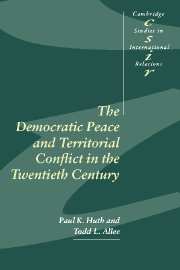Book contents
- Frontmatter
- Contents
- List of figures
- List of tables
- Acknowledgments
- 1 Another study of democracy and international conflict?
- 2 Pathways to conflict escalation and resolution in international disputes
- 3 The international strategic context
- 4 Domestic institutions and the Political Accountability Model
- 5 Domestic institutions and the Political Norms Model
- 6 Domestic institutions and the Political Affinity Model
- 7 Empirical results for decisions to challenge the status quo
- 8 Empirical results for decisions to offer concessions in negotiations
- 9 Empirical results for decisions to escalate with military force
- 10 What have we learned about the democratic peace?
- Appendices A–F
- Bibliography
- Index
- CAMBRIDGE STUDIES IN INTERNATIONAL RELATIONS
- References
Bibliography
Published online by Cambridge University Press: 22 September 2009
- Frontmatter
- Contents
- List of figures
- List of tables
- Acknowledgments
- 1 Another study of democracy and international conflict?
- 2 Pathways to conflict escalation and resolution in international disputes
- 3 The international strategic context
- 4 Domestic institutions and the Political Accountability Model
- 5 Domestic institutions and the Political Norms Model
- 6 Domestic institutions and the Political Affinity Model
- 7 Empirical results for decisions to challenge the status quo
- 8 Empirical results for decisions to offer concessions in negotiations
- 9 Empirical results for decisions to escalate with military force
- 10 What have we learned about the democratic peace?
- Appendices A–F
- Bibliography
- Index
- CAMBRIDGE STUDIES IN INTERNATIONAL RELATIONS
- References
- Type
- Chapter
- Information
- Publisher: Cambridge University PressPrint publication year: 2003



